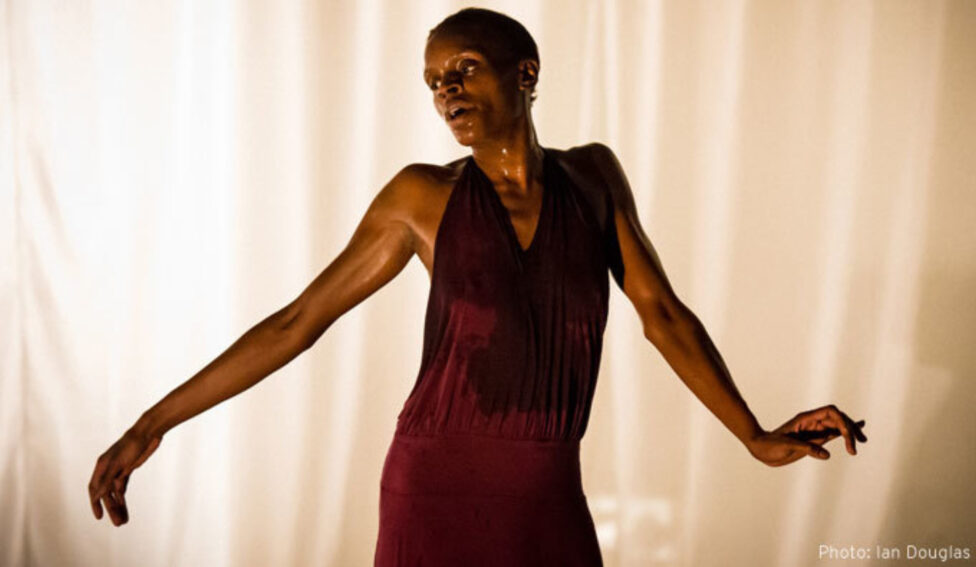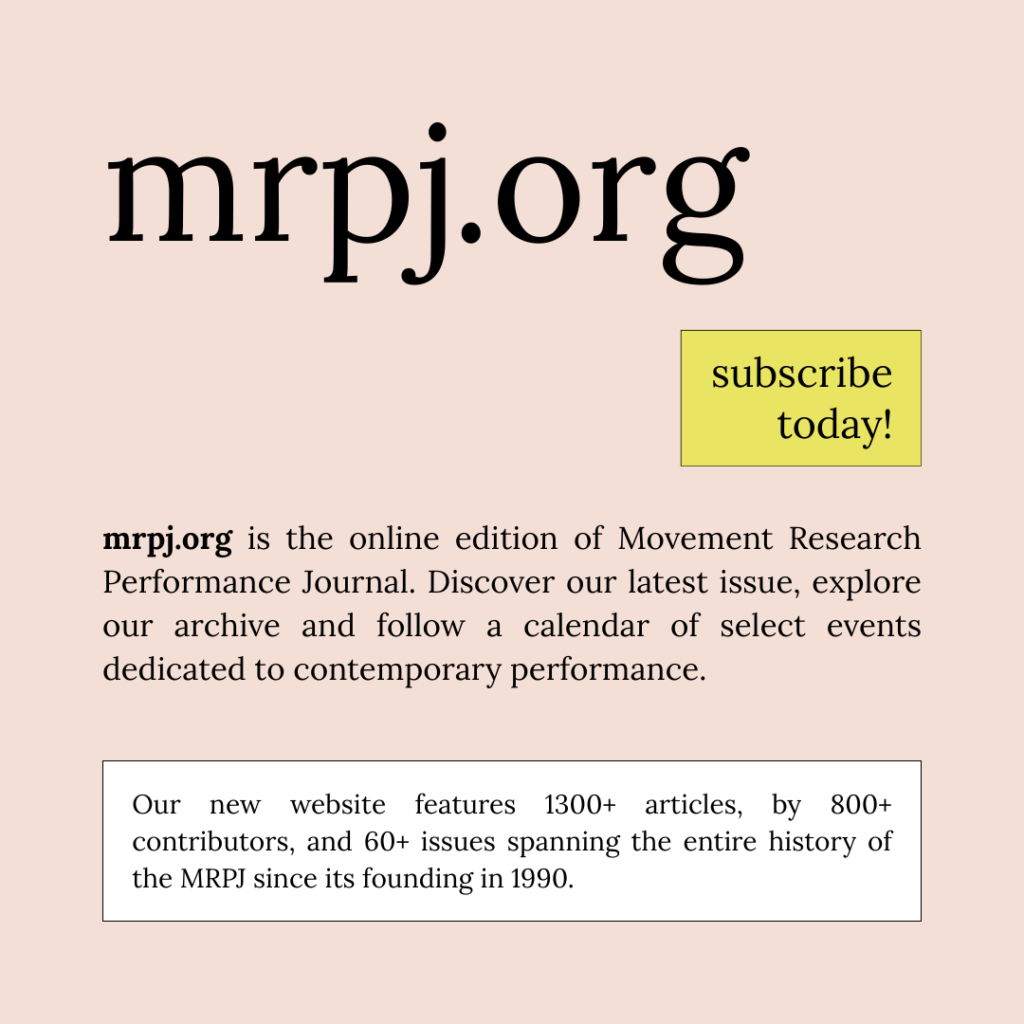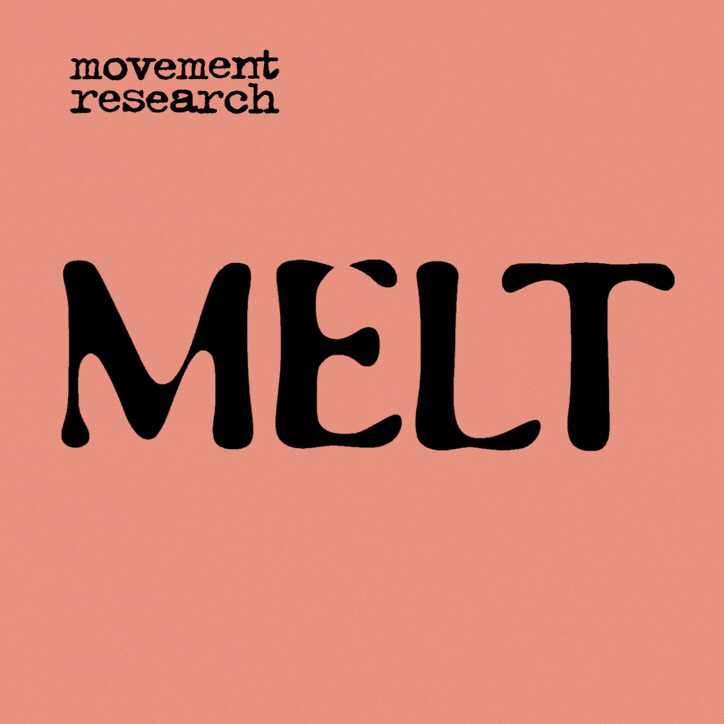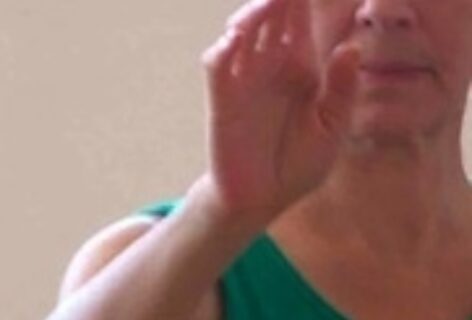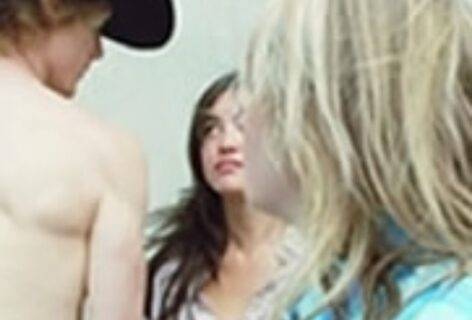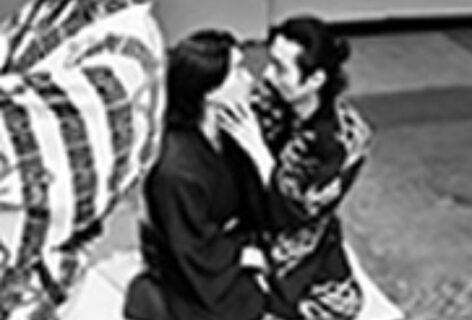Tess Dworman: I mostly want to talk about Bronx Gothic. I saw the piece at Danspace Project a few years ago and then recently saw the film. I was kind of amazed by how the film actually immersed us deeper into the research. Also the descriptions of your experiences performing, I mean put pretty simply, the things you said were so vivid, and for me as a performer felt so spot-on to what it’s actually like – that improvisational process of navigating material live in front of people and bringing them onto a page with you.
Okwui Okpokwasili: Even though there’s not as much improvisation in it as people might think… the first half-hour is scored so there’s room for me to shift it and change it. But it’s funny I think there was an earlier version at Danspace where even at first, the way the first thirty minutes works, it shifted from when I was doing it on the tour that was captured in Andrew Rossi’s film. By the time the filming happened and I’d been doing the piece for about a year and a half, the score hadn’t changed much for the first thirty minutes. But I guess what absolutely doesn’t change is allowing my internal energy to shift in response to the gaze, the mutual gaze, the giving of it and receiving it or something.
TD: That process of receiving groups of people that you don’t know and letting them receive you… if we think of that as a sort of an end-point, and the starting point being you alone with these ideas in your head…I’m really interested in that process of being alone with a thought before it has language, bringing it into a conversation with your collaborator, with the theater, building material, and then finally transmitting it to groups of people.
OO: Right, right.
TD: …and finally arriving at that score. I’m curious about that.
OO: The score, that takes a long time for me to figure out a framework around a particular physical vocabulary and exploration takes a while for me because I like to have that space shift. I like to be able to shift with it. Like the first thirty minutes of Bronx Gothic, that idea of the twerk gone totally wrong… I like to really push that and push that and push that. Eventually, I did an installation version. I think it may have been the 2014 River to River Festival. I got to do [the initial thirty minute score] for an hour and that was nice. The score was like the text of the whole piece. In the live performance it feels a little bit like that thirty minutes also serves as a prologue.
I was trying to communicate in the film that as a young girl, I was very– I’m not saying everybody feels this way– but that sense of looking for yourself in the larger cultural narrative that’s being projected and not finding it, and feeling somehow that that presages your invisibility. Or if there is a projected cultural narrative or social narrative, and you’re not a part of it but you’re always watching it… not only you but the community that you live in, the communities that you regularly get life from… I mean I felt it as a massive kind of absence and I wanted to write it in. I wanted to fill that absence in some way.
There’s been an awareness for me for a long time of what it means to put yourself in places where you ostensibly may not belong or where there wasn’t anyone like you. My awareness when I see brown bodies, or the phenomenon that happened back in the day: it’s like, you see a black person on TV and everybody… your mother’s like “Hey hey hey!” Everyone comes and collects to see like, ok what is this signifying? What does this mean? I felt from an early age that brown and black bodies inhabited a very charged space, that their bodies were charged. There was no neutral zone. We don’t come into a space free. There’s all of these things on our bodies, or these signals that our bodies send to folks.
I built a practice as a performer, having felt that and knowing that even sometimes I’m performing in Downtown New York or Downtown places where there still aren’t many brown bodies even though I’m performing with people who are ostensibly making things and also trying to make space for a different way of looking or a different way of considering performance. I was working in spaces where people are critiquing modes of performance and modes of artistic and cultural production that were largely just about a financial economy, or reproducing oppressive structures and narratives and ways of behaving. In the places where I was gravitating to and attracted to, they were critiquing these larger cultural modes for their homogeneity, and not just of the people inhabiting the spaces but also the forms and structures of narrative.
When you’re entering PS122, you’re looking at places that also… y’know that’s where Karen Finley and Spalding Gray or Robbie McCauley or Annie Sprinkles, all these people who… or just being downtown where they also share a space with Mabou Mines across the street is where the Living Theater had a space for a while… or you’re not far from La Mama. There’s a zone there that is inhabited by people who are saying, “We’re not just going to consider box office or reproducing or worrying about a ‘hit’”. They’re trying in some way to be connected to rituals that kind of bind and build communities, whether it’s critiquing a toxic masculinity and capitalist models that privilege the making of money…
I was just drawn to spaces where I could see forms that I might not be familiar with. I could enter into the unknown. I could go into spaces that weren’t concerned with box office. [They were concerned with what the work was] trying to do on an energetic level, on a political level, or a cultural level, and breaking norms. So I was attracted to those things but also surprised sometimes at how homogenous they felt. They felt like very white, male spaces.
The point that I’m trying to make is that as I grew in my practice, or as I practiced and was looking for spaces that could be a platform for some of what I was exploring physically and theatrically. I was surprised by sometimes how homogeneous even those spaces were for all of the risks they were taking and all of the ways they were trying to build new vocabularies of performance. They could be strangely homogenous. And so I would enter those spaces and still feel that my brown body, black body created some rupture or some disturbance that was still not really addressed because they don’t have the tools to address it. Even at Danspace Project…I think Judy [Hussie Taylor] is doing an incredible job to try to open up the field of what gets a platform through bringing in a really wide range of artists to find other artists, to curate other artists and make spaces for the multiplicity of practices that you can access in New York. It’s about what’s happening in Bronx, Queens, Staten Island, and Brooklyn.
There’s like something really amazing happening but I don’t know how to articulate it at the moment. I think when I’m doing Bronx Gothic at Danspace it is largely for an audience of white folks. I feel like I’ve always been working from a body place, an embodied place which means contending with signals that my body is sending before I do anything. And how do I kind of work with that? I’ve always been concerned with working with that. Also this body is creating a confounding and mysterious space. It’s like “Okay, there might have been certain things you expected from this body, or there might have been a space you expected me to inhabit, but I can play and shift in that, but I don’t ignore that because I begin with my body so that figures very deeply into my practice.” Does that make sense?
TD: Yeah that makes a lot of sense.
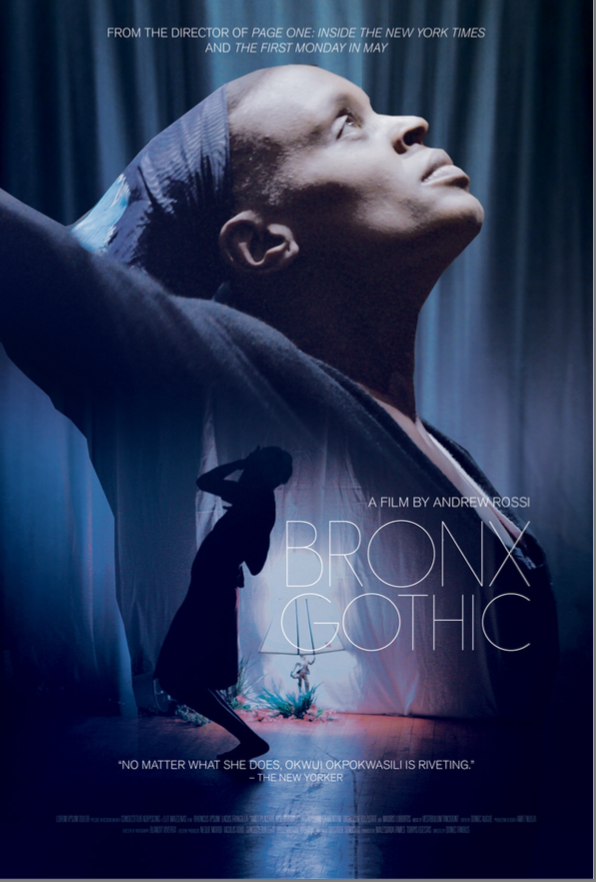
Poster for Andrew Rossi’s film Bronx Gothic, image courtesy of Okwui Okpokwasili
OO: That beginning [of Bronx Gothic], that initial prompt or question, which is never really a beginning actually because it always feels like a continuation….that sense of like, you enter and it’s already begun. In my processes, somehow I feel like it never started. It just was there. It had just begun. I mean it was already in process.
I make pieces with my partner [Peter Born] and it’s already in process. I want people to move into it and then figure out how they’re going to orient themselves. I definitely want to make a space that you choose. You enter, but then you’re constantly aware of the choices that you’re making as well. On some level I’m trying to make a free space for myself but also for [the audience]. So in that initial thirty minutes of the piece, at some point you’re looking at me and I’m looking at you and we’re looking at each other and what does that mean? For all of us to kind of acknowledge where we are and then that ends, and I want to tell you something. I’m just trying to be true to how it feels to be alive sometimes.
TD: It’s so skillful… the way that you carve out that space. Like you said for yourself and then also for the audience.
OO: That’s right.
TD: To come into the world of…
OO: When they choose to.
TD: Yeah, when they choose to. I think there’s something that performers always learn to do for themselves when the piece is being opened up into the world. As a choreographer, I’m learning how to direct people and facilitate a space for that to happen so that the material doesn’t fly away or fly off of the performers’ bodies once audiences come in. Performers can jump into audience’s minds… to somehow let the audience come to you…
OO: That’s exactly right. I love how you say that… the material doesn’t fly off your bodies and you fly into other people’s minds. It’s true. The relationship becomes very uneven very quickly, and how do you restore some sort of balance so that the material stays in you? I feel like I’m always trying to work in an energetic space. I’m thinking about how you kind of take care and honor that energetic space especially in the context of a proscenium or with strangers. They’re going to come in and their energies, they’re doing stuff. I’m not going to say it’s wrong or it’s right, it’s just a thing and how do I work to hold on to the integrity of the energetic space that I’m making? Then whoever comes and witnesses can be a part of witnessing what the thing is… and it’s not like me performing for you.
TD: I think there was something that you mentioned in the film about this sort of parallel between survival and performing. And I feel like what you’re saying about being ready for anyone…to me, that feels like a question of survival. How am I going to get through this?
OO: Right
TD: But you’re obviously not on the total defense. You’re making yourself vulnerable to groups of people night after night. I’m curious about the strategies that you’ve cultivated in preparation for what I want to call “surviving a performance”.
When you were making Bronx Gothic maybe you already had a sense of how it was going to be when people came in, but then perhaps something shifted when the eyes were actually there.
OO: Right, it’s true. I feel really lucky and happy to be trying to survive on a practical level… doing the only thing I really feel I can do, which is doing this kind of performance. Part of the survival of it is the fact that I get to do it. Do you know what I mean? How would I survive not doing the performance? I have designed something that requires a particular sort of vulnerability and, I mean part of that thirty minutes is about trying to shed different skins. It’s manifested in the amount of sweat. You feel like there’s layers of dermis coming off of you. So it’s like trying to work from a raw wound …without letting it control the whole entire thing.
[When I’m preparing to perform] there are certain things that I need to have in place and it hasn’t changed. I need a space to be in before it happens. I need to have certain foods and need to stop eating and drinking at a certain time. There’s certain songs that.. I think there was a Górecki song that I was listening to. And then I ask to not be bothered, for people not to deal with me for at least an hour before it happens. Luckily, I have my incredible partner/collaborator who was there to facilitate that and help me make a sphere where I can have my attention where it needs to be.
Sometimes with the initial half-hour, there were times when I had a little fear about whether I could do it again. There’s always a feeling like “I can’t do that again.” But then I’m like, well people have done harder things. You could do it. You could do it. Also, you’ve been doing it! You’ve always done it!
TD: Did it really feel like that?
OO: Sometimes. Oh yeah. Especially if I would do it and then not do it for a while. Then I’d be like, oh my god. But then I’d rehearse it and I would do it. But it’s like of course you can do it! But you know as a performer there’s all these ways you can psyche yourself out. Some people are like “I need to eat this kind of thing, this kind of thing, and it all needs to happen in this particular order.” it’s a little bit like you’re shaping a mind space within yourself so you’ve really gotta cultivate a very thin membrane of consciousness. You’ve really gotta figure out how to keep it just so that you can operate under it, you know? For me it’s like don’t talk. No calls. No nothing for at least an hour before.
And that’s an hour before the half-hour starts. The show technically doesn’t start until fifteen minutes into the half-hour. [As the audience is walking in], it’s nice to feel the freedom of “Well, maybe no one’s paying attention?” I’m not looking. My back is towards them. It’s the sort of thing where I can’t assume they’re looking.
It’s nice to kind of be out there in space with folks where who knows if they’re looking or not? I’m not going to make any assumptions. I know a lot of people like to be like “Oh that was a good audience. That was a bad audience.” You get into this thing where you start to judge how you’re doing by the audience’s reaction and then you start to judge what kind of audience they are by how they’re reacting… this weird kind of mind game. I’m not even interested in playing that game. I don’t even care. I don’t know what you’re thinking. I’m not going to assume it. You’re free to do whatever the fuck. You’re free to experience joy by not saying anything. I definitely like to make the pieces not contingent on my expectation of a particular reaction of the audience too and try to free myself from certain… contracts. And I hope I’m freeing the audience too.
TD: Yeah.
OO: When you’re watching something and someone is begging you to laugh it makes me very uncomfortable and I feel bad. You do what you do. I’m not judging you. You came. I appreciate that. That shows some generosity.
TD: I mean that’s another form of this really skillful preparedness about performance. You’re preparing yourself to be in front of a group of people and to do your thing no matter who they are or what they do.
OO: Right, or what they think.
TD: Yeah
OO: It can be really lovely.
TD: Yeah it is so lovely and specific to each person, and…
OO: And open! I feel that if I’m free of what you think then maybe you can be free from what I think. I free you from having to have it mean a particular thing. You know?
TD: I’ve been feeling lately like that I wish I could be the kind of person, like in my life, the way I am when I’m a performer.
OO: Like a generosity… trying to cultivate as much generosity as you can.
TD: But not giving it all away.
OO: You’re asking for a particular generosity and attention. It’s a way of being bound together.
TD: When you say you want to be free from what the audience thinks and you want them to feel the same toward you. That’s a sort of unconditional love, empathy kind of thing y’know?
OO: Yeah, hopefully.
TD: …that I wish we were working on in more spaces and for more reasons.
OO: I mean obviously, right now, I feel like I’m enraged every day and I feel that it’s becoming even more apparent what our culture values, or maybe we’re just in a space where the balance of power is so uneven. The majority is being ruled by a minority of people who hold minority beliefs about gender norms and race norms… and who overvalue wealth as some kind of determinate of worth. By being wealthy there is virtue. But I’m thinking maybe that’s just a minority. The way we’ve structured things in the system, that minority has a lot of power.
TD: Absolutely, yeah.
OO: It feels especially important now to keep cultivating these spaces of generosity. Or to consider other ways of relating that aren’t so obviously transactional.
TD: Yeah, it’s like reassigning value because we can’t live off of the value systems that we’ve created so you have to change it.
OO: It’s like fires on one end of the country, floods in the other…
[Work by Rihanna plays in background]
TD: *laughs* Dance break.
OO: That’s how Nigerian functions operate. Like seriously, someone’s talking “dedededah…” and then there’s literally a dance break in the program. Like a diplomat is speaking… you have the key note “dedededah, first chorus, dance break”. It’s really serious business.
TD: That’s amazing.
OO: …but in sharing space, wow if we just come into a room together, it’s fucking Quaker! If we just sit here in silence, it could be quite profound. To bring the attention back to what it means to be present with each other. That’s just really powerful.
TD: And it’s an ancient thing.
OO: Yes, it’s ancient, it’s primordial. I work from that belief.
TD: It’s relieving to be in a space where…
OO: …that’s trying to honor that.
TD: Yeah, because it’s not going away. It can’t be sold.
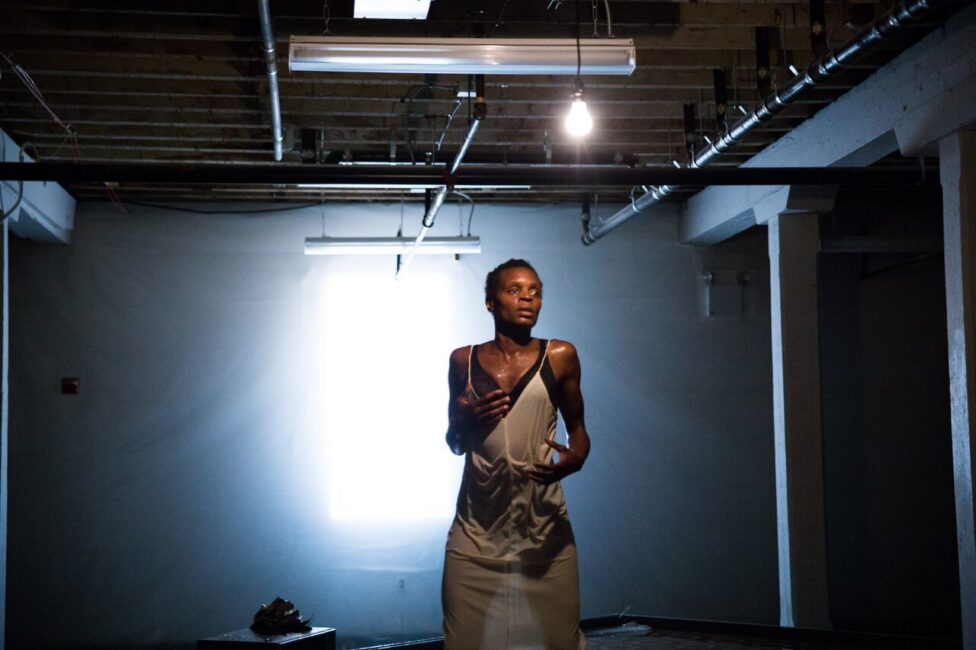
Okwui Okpokwasili, image courtesy of the artist
TD: I wanted to ask about the conversations you had [in the film] with…
OO: The ladies and the gentlemen?
TD: Yeah
OO: I think there was a good amount of the film that captured the performance and the conversations that happened when we were doing it out at Alverno Presents which was a presenting organization at Alverno College in Milwaukee, Wisconsin. It no longer exists. They cut that. But sometimes when you go to these universities that have these presenting organizations, part of the task is also to do a kind of master class, to meet and have conversations with folks as a way to build audience and forge deeper connections with the academic community. Sometimes that can be kind of taxing because you’re like “Isn’t it enough that I’m doing a performance?” For the kind of work that we’re doing, it’s just sometimes to get people in the seats. You’re doing outreach. But I really did appreciate some of the conversations that we were having around Bronx Gothic especially as it contends with what it means to be an invisible black girl. The urge of her own sexual awakening, or what it is to recover from sexual trauma when you’ve been in physical… or how do you even find names for it when you don’t know what’s happening to you? Then, how do you get back into your body? How do you deal with the fact that now pleasure and pain are entangled?
TD: They’re like life skills that you’re going through in the piece.
OO: I mean I didn’t have any of the answers.
TD: But your experiences are the answers, if there are any answers.
OO: Yeah. I don’t know if it’s in the film so much. The challenge of the film was how to capture that thing we’re talking about: that essential, primal need and the space that we all recognize as sacred when we come together. I think what Christianity and the Bible says is that when two or more of you meet, Jesus or God is present, right?
TD: I didn’t know that actually.
OO: Yeah. And it’s not just Jesus. This suggestion that when we all come together and are present together, God is in that? Right? It’s not just that God is something that sits on a perch hovering over you, but is a thing that is generated between you. I’m trying to make this space that honors that but, gosh… I don’t know but it’s just, when I was a young girl, I just feel like, yeah black and brown girls, God is there too when we come together. I don’t know, I’ve lost the train of my thought. I totally fucking forgot.
TD: That’s okay, we’ll come back. This kind of circles back to that ancient ritual tradition whatever. People simply gathering and there being something in the room that can’t, that won’t…
OO: I couldn’t have made it without them. It doesn’t exist in the room just with me by myself.
TD: I have a few like tips and tricks for myself. To like, get into that mode of getting ready to offer something, you know getting into that space…
OO: What are your tips and tricks?
TD: Well they’ve kind of like changed through the years, but I guess it took me a long time to figure out how to surprise myself in a performance. And a tip and trick for doing that is, well, it’s really hard, but it’s to not repeat something that has worked in the past. That’s really really hard to do.. to let go of something that has felt like it worked, you know? But also giving myself permission to do what I know how to do. I guess that’s sort of an obtuse trick.
OO: No, that’s not obtuse it’s great. I guess I don’t feel like I need to surprise myself. *laughs* Which maybe is an easy way out. I mean no, that’s a huge task. I’m like, “Hm, can’t worry about that.” Because then I feel like I will fail too much, when there’s so much I’m already probably failing at.
TD: Right, yeah.
OO: I don’t need to bring that into the mix.
TD: Any special surprises.
OO: Like do something, don’t do something. But then again I also think there’s something about that whole, “working” thing, the supposition that something “works.”
TD: Yeah.
OO: I don’t think about if something works or not. But maybe that’s not true… I know I need that space before I start… always. Maybe that’s a thing that I know works. But I just don’t think about it in those terms, it’s just like a thing that I need. I just need to cultivate a space where I can be working. It’s not a beginning. It’s just where I’m in process and you can come in and do what you need to do. I feel like I just thought of it in that way for the first time. Maybe I’m doing something that just works? But I don’t know how I’m going to do it. I don’t necessarily do it in the same way… and it’s not even that I think about it consciously. In my rehearsals, generally we give people a lot of space to explore and so that’s also part of the process that I don’t want to lose. But generally the working thing, what works… sometimes it feels like that’s the tyranny of the transaction for me. It’s like, “ok you come in here, I make you interested in me and so then I have to do these things that are interesting to me.” I want to be interested. I want to be compelled, but I don’t want to make it necessarily work.
I’m not really sure what that is because I’m trying not to make assumptions about you and how you’re going to feel and how things are going to affect you. I’m trying not to know that. We all do these mind things for ourselves.
TD Yeah and telling myself I’m not going to do the thing that I know works. I’m not going to create satisfaction for anyone because that’s not what I’m trying to do, although I do feel like I’m searching for more things that create satisfaction for myself and then for other people.
OO: Right, right. Satisfaction is the thing.
TD: Yeah.
OO: Yeah, being satisfied. Not that you’re right, but that this, right here, right now, is what has to happen.
TD: It’s like we’re on a page together. Finding more ways to do that…
OO: It’s so elusive. It’s just a fucking trap.
TD: It is! *laughs*
OO: It’s a trap! A venus flytrap!
TD: Yeah.
OO: You will not snare me, but you do! It is mine! Ah, I am being surprising! Make it work, don’t make it work! Surprise no one!
TD: Yeah, we’re magicians, basically. You, especially are.
OO: Well, we’re magicians without the magic. There’s no sleight of hand. The magic is just being there. Because magicians are like really heightened performers. They’re ensnaring, ensnaring, ensnaring. And they’re getting you here and…
TD: Yeah it’s amazing.
OO: I like magicians.
TD: Yeah, they really take us somewhere.
OO: They really fuck with you.
TD: As performers tend to do.
OO: Except, I feel like I don’t.
TD: You don’t fuck with people?
OO: No I don’t feel like I do. I’m just there. It’s fucked up because I don’t feel like I want to manipulate anyone. I’m trying to work from a space that’s not manipulative. And I think there are some performers who find power in that. I think there is some power in that. I’m not saying that when I go to a performance I don’t want to be manipulated. I also want to be manipulated. What am I talking about?
TD: I don’t know. It’s very stealthy. It’s stealthy manipulation.
OO: It’s gotta be just outside of your reach to grasp what you’re doing… like you kind of know but you can’t hold it.
TD: Right
OO: Once you get ahold of it, it’ll disappear and you’ll never know it again. That’s maybe the magic.
TD: This is the surprising thing I think I’m talking about. To stay in this sort of place where you have your feet on the ground, but it’s slippery.
OO: Yes, that’s right.
TD: And you just go with intuition and trust and your own sense of what the material is, instead of these sort of like outside objects of what “works” yeah… I don’t know, slippery…
OO: The slippery thing… that’s right. I like that. Your feet are on the ground, but it’s slippery. And the ground is moving.
TD: The ground is moving, yeah.

